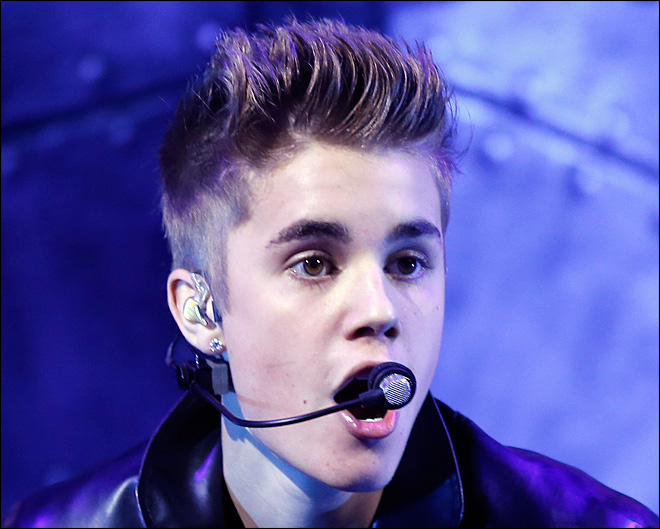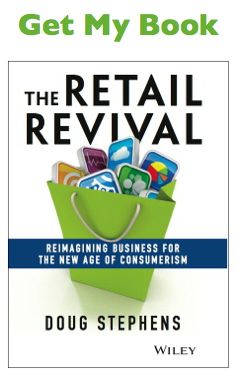By Doug Stephens

Human beings are fundamentally resistant to change. Most of us would be happy carrying on with an as-is world that is largely free of disruption, and some of us are downright militant about preserving the status quo. Humans hate change…period.
So why is it that the strongest brands seem intent on heaping change on us?
In the last 3 years alone, Justin Bieber has released 11 albums. No kidding – ELEVEN!
- My World – 2009
- My World (Bonus Track Version) – 2009
- My World 2.0 – 2010
- My World 2.0 (Bonus Track Version) – 2010
- My World – The Collection – 2010
- My World Acoustics – 2011
- Never Say Never (The Remixes) – 2011
- Under the Mistletoe – 2011
- Under the Mistletoe (Deluxe Edition) – 2011
- Believe – 2012
- Believe (Deluxe Edition) – 2012
Compare this to the 1970’s band Fleetwood Mac who, even at the peak of their popularity, between 1975 and 1979, pressed a mere 3 discs.
Consider that the iPhone has gone through 6 generations in just 5 years! Or Facebook, who, just when we get comfortable with the look and functionality of our timeline, does something to screw with it.
So why, if humans hate change so much, are the world’s elite brands committed to giving us a continual stream of it?
I think there are a few reasons.
Abundance
Consumers are being hit with a daily fire hose of “newness” and good brands know this.
One recent study recently suggested that Gen Y moms (those born after 1984) define “loyalty” as sticking with a brand or retailer for six to twelve months and unless continually fascinated by a brand guess what – they were moving on. Not because they’re fickle or promiscuous consumers but because a universe of cool new stuff is vying for their attention. Consumers, especially young consumers, have become used to having a world of choice at their fingertips.
In a landscape of such endless and abundant choice, our entire precept of what loyalty means and the timeframe we’re prepared to be patient with a brand that isn’t evolving has changed completely.
Access
Markets that were once heavily walled fortresses with significant barriers to entry now have revolving doors. Consider that a 1970’s music hopeful had to first play a thousand shitty bars, get discovered, be signed to a label, write and record a full album and then (only if they were incredibly lucky) get it played on the radio enough to be noticed. Today, anyone with talent, one song and a video camera can break in. Just ask Psy. The same concept of easier entry and access is true in just about every category across the economy.
Even financial markets, once assumed to have the highest of all barriers to entry, are being infiltrated by non-billionaires. Payment system Dwolla which was begun by University of Northern Iowa drop out Ben Milne in 2007 at the tender age of 18, now moves in excess of a half a billion dollars in payments annually.
Great concepts are able to break through in an unprecedented way and with unbelievable velocity. As a result, all great brands are running hard to bring us the latest, cutting edge innovation – before some kid from Iowa does!
Speed
When Nokia was leading the market in mobile handset sales in the early late 1990’s and early 2000’s, it was disrupting the market about once a year. Today, according to Marcelo Claure, CEO of the mobile company Brightstar, the current innovation cycle in the mobile industry is running at a dizzying 21 days!
Consequently, as consumers, our whole outlook on brands and innovation has changed. Whether we know it or not, we’re all looking for the next big thing, the innovation we didn’t know we wanted but desperately crave. We all want the next Justin Bieber – well O.K., bad example – but you know what I mean.
We say we hate change but increasingly we can’t (and won’t) live without it.
Regrettably, “rapid-fire change” in the retail industry has traditionally meant changing up your store design more frequently than every 5-7 years – an eternity by today’s standards. It’s been a sector of the economy largely lethargic and resistant when it comes to change. But given the sheer volume of disruption knocking at its door, change is becoming less optional with each passing day.
So, what does this mean for your retail business? It means asking if you are the Justin Bieber in your category or burned out 70’s band. If you’re the one walking the fine line between fascinating and frustrating your customers with change they didn’t know they wanted or a business more interested in selling the status quo to the minority who don’t care anyway. One thing seems certain – if you’re not prepared to reinvent, revolutionize and re-imagine what you do, someone, somewhere will be happy to do it for you.
Justin Bieber in your category or burned out 70’s band. If you’re the one walking the fine line between fascinating and frustrating your customers with change they didn’t know they wanted or a business more interested in selling the status quo to the minority who don’t care anyway. One thing seems certain – if you’re not prepared to reinvent, revolutionize and re-imagine what you do, someone, somewhere will be happy to do it for you.

